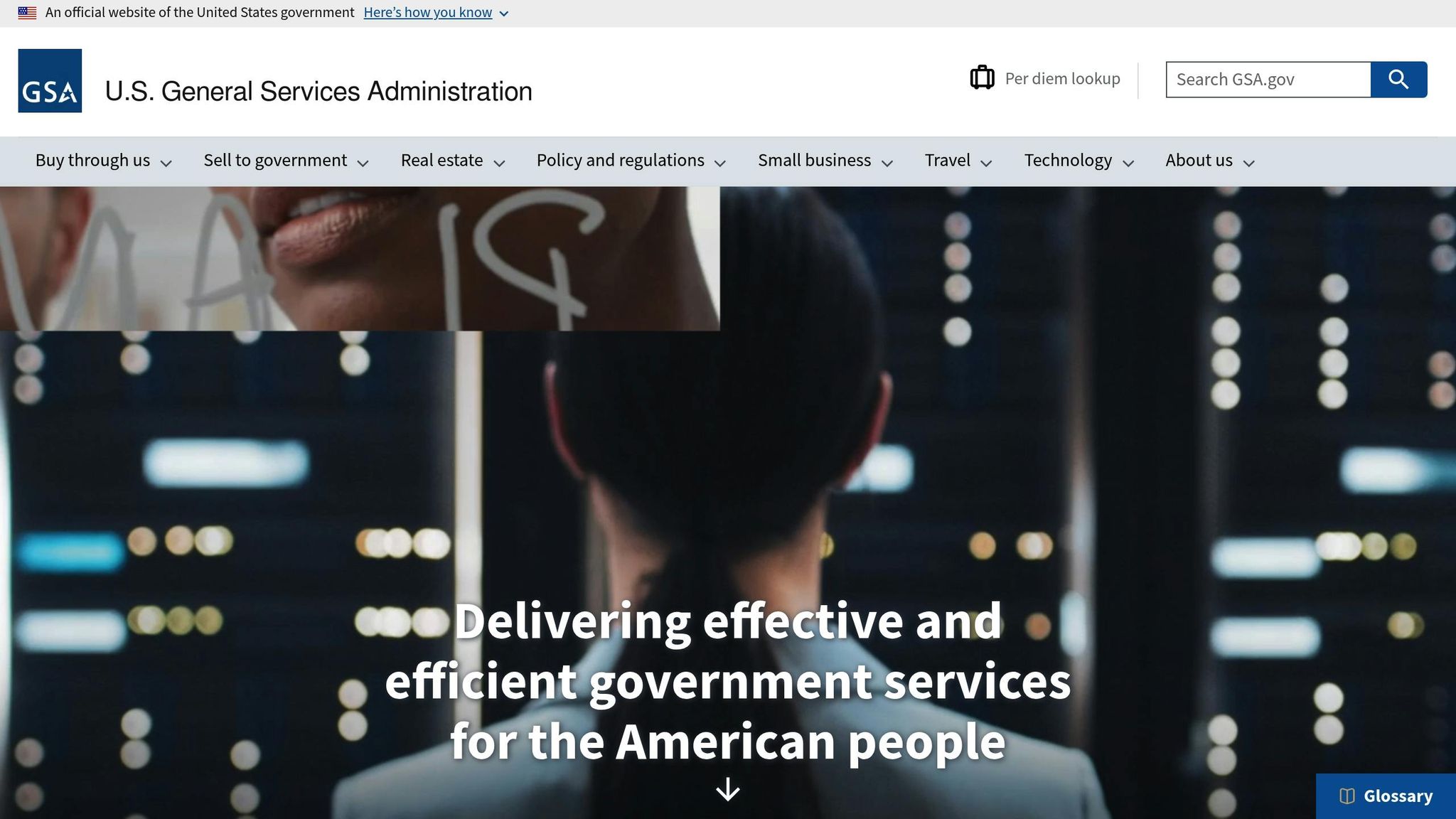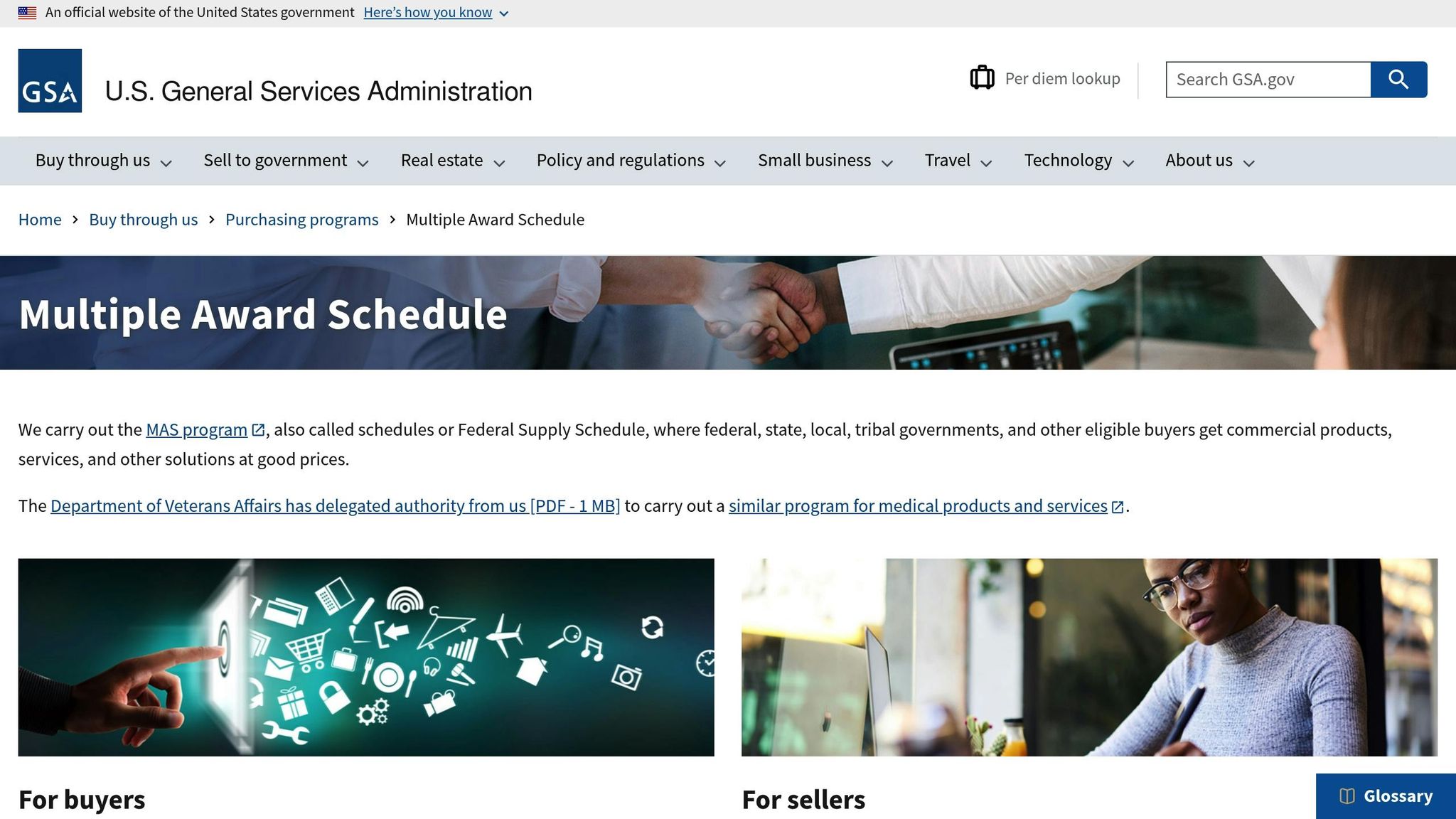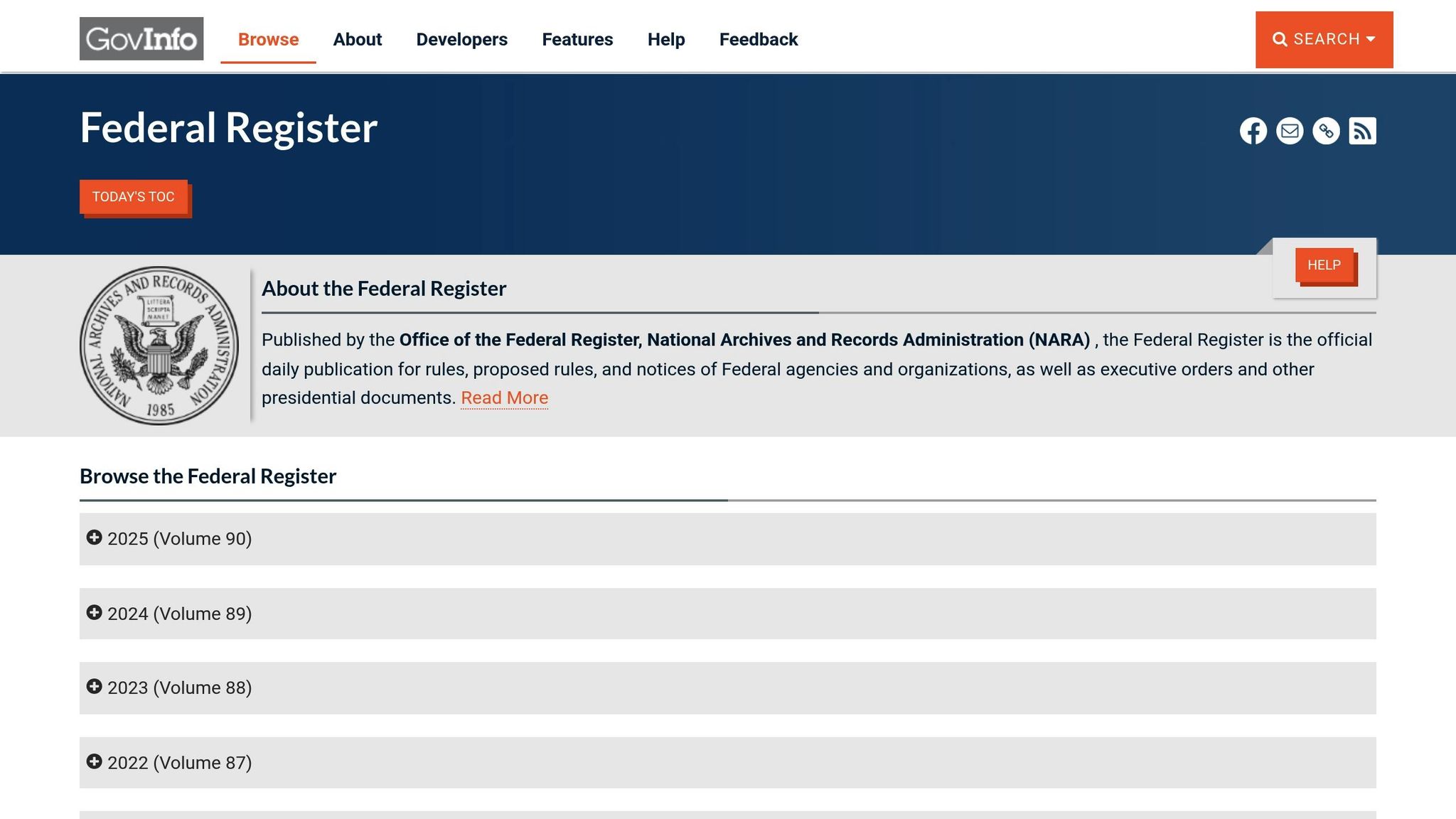Big changes are coming to federal contracting in 2025. Here’s what you need to know about the new legislation affecting GSA Schedules:
- Updated Sales Thresholds: Contractors must hit $100,000 in sales in the first 5 years and $125,000 in the next 5 years to keep their contracts.
- Pricing Flexibility: New rules allow more frequent price adjustments, but with stricter documentation requirements.
- Cybersecurity Mandates: Stronger security measures, including Zero Trust strategies, are now required for compliance.
- Simplified Sustainability Rules: Non-statutory environmental requirements have been removed to reduce administrative work.
- Transactional Data Reporting (TDR): Expanded to more products and services, replacing older reporting methods.
These changes will reshape how contractors work with the federal government. Staying compliant and proactive is key to thriving in this new environment.
GSA‘s Mandatory Transactional Data Reporting Expansion

Key Legislative Updates in 2025
The legislative landscape in 2025 has introduced sweeping changes to federal procurement, representing one of the most extensive updates to federal contracting regulations in decades. Below, we’ll break down the major updates stemming from the GSA MAS Refresh, Federal Acquisition Regulation (FAR) amendments, and new executive orders shaping the contracting environment.
Major Changes from GSA MAS Refresh 25

On March 25, 2025, the General Services Administration (GSA) unveiled Refresh 25 to the Multiple Award Schedule (MAS) solicitation, introducing significant shifts in contractor requirements. These changes largely stem from executive orders issued by the current administration.
Here are the key updates:
- Exclusions for Certain Products and Services: Executive Order 14168 now prohibits federal funds from being used to promote gender ideology. As a result, any products, services, or solutions that violate this rule are now excluded from the MAS program.
- Scaling Back Environmental Requirements: Executive Order 14148 has rolled back non-statutory sustainability criteria, removing many previous environmental requirements from MAS program instructions.
- Paper Straws Ban: Executive Order 14208 requires agencies to stop procuring paper straws and ensures they are no longer available in federal buildings.
Additionally, Mass Mod A893 has been released, requiring schedule holders to review and accept these changes within 90 days using the Mass Mod System.
Federal Acquisition Regulation (FAR) Amendments
The Revolutionary FAR Overhaul (RFO) initiative marks a historic effort to modernize the Federal Acquisition Regulation (FAR) for the first time in over 40 years. While MAS updates focus on specific program changes, this overhaul addresses the broader federal acquisition framework.
The FAR, which spans more than 2,000 pages and governs nearly $1 trillion in annual spending, is being rewritten in plain language to make acquisitions faster and encourage greater competition. On May 28, 2025, GSA hosted a webinar with over 8,000 participants to engage industry stakeholders. Technical updates are already underway, including revisions to FAR Parts 1, 17, 33, and 52.
To further streamline processes, agencies have been instructed to simplify their FAR supplements by removing regulations not directly tied to statutes or executive orders. Contractors have until September 30, 2025, to provide feedback on FAR deviations.
New Executive Orders Impacting GSA Schedules
Defense contracting is undergoing substantial changes, driven by a memo issued in April 2025 by Defense Secretary Pete Hegseth. This directive calls for a shift toward performance-based contracts, cost-effective multi-year agreements, and funding focused on critical capabilities like unmanned systems and electronic warfare.
The fiscal impact of these adjustments is notable. The White House’s fiscal year 2026 budget request outlines a 23% reduction in non-defense discretionary funding, while defense funding sees a 13% increase.
Modernizing technology remains a priority. GSA Acting Administrator Stephen Ehikian emphasized the importance of these investments:
"These investments not only replace outdated systems but also streamline critical operations, ultimately improving services for government employees and delivering greater value to taxpayers".
Federal CIO Gregory Barbaccia echoed this sentiment, stating that the Technology Modernization Fund (TMF) has been restructured to serve as a permanent part of the government’s modernization strategy rather than a temporary fund.
For contractors, these updates bring immediate compliance challenges but also open up strategic opportunities for those ready to navigate the evolving regulatory landscape effectively.
Impact on GSA Schedule Holders
The 2025 legislative changes bring about key operational shifts for GSA Schedule holders, touching on pricing strategies, cybersecurity protocols, and compliance costs. These updates will affect thousands of contractors, spanning businesses of all sizes. Let’s dive into how these changes reshape the contractor landscape.
Pricing and Cost Structures
One of the most notable changes is the adjustment to pricing flexibility, which lifts many restrictions put in place during the COVID era. Previously, the Economic Price Adjustment (EPA) clause limited price increases to no more than three times a year, capped at 10% annually, with a mandatory 12-month wait between approvals. Under the updated EPA 552.238-120 clause, contracting officers now have more discretion, requiring vendors to adjust their pricing strategies. This includes a new "4P" analysis framework – product, price, place, and promotion – to justify price changes.
Vendors impacted by tariffs can also modify their GSA Schedule contracts under the EPA clause, but any higher prices for GSA must first be applied to commercial or non-GSA customers, supported by proper documentation.
Additionally, updated sales performance standards now require contractors to meet specific benchmarks. For the initial five-year contract, vendors must achieve at least $100,000 in sales, while the second five-year term demands a total of $125,000. Contractors failing to meet these quotas or other performance metrics may face increased scrutiny from GSA.
Cybersecurity and Data Protection
The new cybersecurity mandates add another layer of compliance for GSA Schedule holders. Executive Order 14028 emphasizes stronger cybersecurity measures and software supply chain integrity. GSA has clarified:
"Modification of contract language to reflect new guidance from NIST and CISA. If your company cannot accept the modification, you will not be able to sell to the Federal government".
The updated rules focus on supply chain security, secure software practices, cyber incident reporting, and standardized requirements for federal systems. With 96% of organizations favoring a Zero Trust cybersecurity approach and 81% planning to adopt such strategies by May 2025, the shift toward more robust security is clear. Companies leveraging advanced security automation can also reduce breach costs by 33%, or $1.88 million, compared to those without such measures.
To stay compliant, GSA Schedule holders must monitor SAM.gov for FASCSA orders quarterly and conduct regular compliance audits.
Sustainability and DEI Compliance
Changes in 2025 also redefine sustainability and diversity, equity, and inclusion (DEI) requirements. In January 2025, GSA announced a temporary suspension of DEI enforcement in existing contracts. This includes revised terminology requirements and halted enforcement activities tied to women and minority protections under Executive Order 11246.
Contractors must now update internal policies, training materials, and personnel practices to align with the new standards. While these updates reduce some compliance burdens, they also create transitional challenges.
Pros and Cons of New Legislative Requirements
The 2025 updates present a mix of benefits and challenges for GSA Schedule holders, as summarized below:
| Requirement | Advantages | Disadvantages |
|---|---|---|
| Pricing Flexibility | Easier adjustments to reflect market changes | Longer approval processes and more documentation |
| Cybersecurity Standards | Opens doors for vendors meeting security protocols | High implementation costs and ongoing monitoring |
| Revised DEI Requirements | Reduced paperwork for some compliance activities | Transitional confusion and policy updates needed |
| Sales Performance Standards | Clear benchmarks for contract retention | Risk of termination for underperforming contractors |
Josh Gruenbaum, Federal Acquisition Service Commissioner, highlighted the strategic intent behind these changes:
"By refocusing the program on the items and services the government is actually buying, we can help our industry partners maximize their time and efforts while providing the best pricing possible for these mission-critical needs".
For GSA Schedule holders, especially smaller businesses with limited resources, adapting quickly to these changes will be crucial. Staying competitive in the federal marketplace means embracing these requirements proactively while maintaining a sharp focus on compliance and performance.
Changes to Compliance and Reporting
The 2025 legislative updates are set to bring about notable changes in how GSA Schedule holders handle compliance and reporting. While some processes have been simplified, new reporting demands will require contractors to make proactive adjustments to remain compliant.
Sales Threshold Adjustments
Starting May 2025, contractors face updated sales thresholds. According to Winvale, and partly influenced by the Department of Government Efficiency (DOGE), contractors must achieve $100,000 in sales during the first 60 months of their contract. For each subsequent 60-month period, the threshold increases to $125,000. Falling short of these benchmarks could result in contract cancellation. GSA has aligned these sales periods with contract options to establish clearer performance expectations. Lucy Hoak, Proposal Writer at Winvale, emphasized the importance of compliance:
"Contract compliance should always be a priority for Multiple Award Schedule (MAS) contractors, but it’s now more important than ever".
Beyond meeting sales goals, contractors must also demonstrate responsiveness. GSA now tracks email communication as part of compliance, requiring contractors to respond promptly to inquiries and maintain up-to-date contact information in the eOffer/eMod system.
The following sections outline additional updates to reporting requirements, focusing on sustainability, DEI, and transactional data.
Sustainability Reporting Updates
GSA has simplified sustainability reporting by removing references to non-statutory sustainability requirements. This change allows contractors to focus solely on meeting federal environmental standards mandated by law, reducing unnecessary administrative burdens.
DEI and Affirmative Action Reporting
Changes to DEI reporting have also been introduced. GSA has removed references to affirmative action compliance from standard contract terms. Instead, contractors must now certify that their DEI programs adhere to federal anti-discrimination laws. Attorney General Pam Bondi clarified prohibited activities, stating:
"Programs, initiatives, or policies that discriminate, exclude, or divide individuals based on race or sex".
Transactional Data Reporting (TDR)
Transactional Data Reporting (TDR) requirements are expanding to include 62 new product and cloud services Special Item Numbers (SINs) by June 2025. GSA plans to extend TDR to all remaining SINs by fiscal year 2026. This expansion aligns with ongoing efforts to modernize contracting processes. Stephen Ehikian, GSA Acting Administrator, explained:
"Expanding our use of Transactional Data Reporting will provide critical insights into pricing and procurement, ultimately ensuring taxpayer dollars are spent wisely".
Josh Gruenbaum, Federal Acquisition Service Commissioner, echoed this sentiment:
"Comprehensive data on purchased items and corresponding prices will empower our contracting officers to negotiate effectively and secure the best value for taxpayer dollars".
As TDR becomes fully integrated into GSA MAS contracts, traditional CSP disclosures and PRC requirements will be phased out in favor of more efficient, business-friendly practices. GSA estimates that these changes will save vendors tens of thousands of hours in reporting time. However, contractors may need to update their systems to capture detailed, line-item-level data. Notably, while GSA MAS contracts will adopt TDR, VA’s FSS contracts will continue using traditional reporting methods.
To navigate these updates successfully, contractors should maintain thorough documentation of policy changes, program adjustments, and staff training efforts. This proactive approach will help demonstrate compliance during any investigations. The evolving compliance landscape requires contractors to stay ahead of both existing and emerging obligations.
How Vendors Should Prepare
With recent shifts in compliance and reporting requirements, vendors need to fine-tune their internal operations to align with the new legislative standards. For GSA Schedule holders, preparing for the 2025 updates means taking deliberate steps like conducting thorough internal audits, updating staff training programs, and working with professional services to upgrade systems and processes.
Conduct Internal Audits
Internal audits are a must for identifying and addressing compliance gaps. These audits help ensure contractors are offering their best prices and honoring the "lowest price" guarantees tied to their GSA Schedule. During pre-award audits, agencies might request various documents, including transactional sales data, audited financial statements, CSP disclosures, discounting policies, commercial agreements, and service offering descriptions. Vendors should focus on gathering this documentation, preparing management for interviews, and maintaining a detailed record of compliance-related communications. Since audit selection is often based on risk assessment and the projected size of a contract, a strong internal audit process can help reduce potential compliance risks down the line.
Staff Training and Policy Updates
Regulatory updates, such as FAR deviation CD-2025-041 on DEI and climate initiatives, make staff training more critical than ever. Starting February 15, 2025, Federal contractors will no longer use the term "gender identity" in prospective contexts. Training programs should also focus on safeguarding sensitive information, including Controlled Unclassified Information (CUI) and Personally Identifiable Information (PII). Employees need to understand the Privacy Act of 1974, secure data-sharing protocols, and access limitations.
To support these efforts, take advantage of GSA’s resources, like on-site training sessions, webinars, and online modules. Additional cybersecurity training through CISA’s Federal Cyber Defense Skilling Academy can further enhance staff readiness. Don’t forget to review existing contracts and internal DEI policies with legal counsel to ensure they align with updated requirements. These updates, combined with professional services, can help strengthen your compliance strategy.
Use Professional Support Services
Navigating the 2025 legislative changes is no small task, which is why professional support services can be a game-changer. With Transactional Data Reporting (TDR) now mandatory for SIN holders, contractors need systems capable of capturing detailed, line-item data. GSA plans to expand TDR to 62 additional product and cloud services SINs by June 2025, with full implementation across all SINs expected in fiscal year 2026.
Professional consultants can help ensure your systems are equipped to handle these requirements. They can also assist with managing Order Management processes, monitoring Scorecard performance, and staying ahead of emerging agency trends. Leveraging their expertise not only strengthens your compliance framework but also positions your business to adapt effectively to the evolving federal contracting environment.
sbb-itb-8737801
Resources for Monitoring Legal Changes
Keeping up with legislative changes is crucial for staying compliant, especially in the ever-evolving regulatory environment. Here are some key resources to help you stay informed and avoid potential compliance issues.
Federal Register and GSA Interact

The Federal Register is your go-to source for official government announcements, including regulations and executive orders that impact GSA Schedule holders. It provides essential updates on regulatory changes and key notices you need to be aware of.
For a more interactive approach, check out the revamped GSA Interact platform at https://buy.gsa.gov/interact/. This site serves as a central hub for communication between GSA, the federal government, and industry partners. It’s a great way to stay informed about upcoming opportunities and solicitation updates. Simply log in with your GSA FAS ID to manage subscriptions and receive email notifications. Subscribed communities are conveniently displayed at the top of your page for quick access.
However, keep in mind that the new GSA Interact website doesn’t have a built-in search feature. To find specific information, you can use Google with this search format: site:buy.gsa.gov [your keyword].
Beyond these official channels, industry associations can further enhance your awareness.
Industry Associations and Networks
Industry associations are invaluable for staying informed about regulatory changes that affect federal contractors. For instance, the National Association of Government Contractors (NAGC) offers resources tailored to GSA Schedule holders. These include training guides on topics like marketing to government agencies, becoming a contractor, selling through a GSA Schedule, and maintaining ethical practices in federal contracting. Engaging with these associations also provides access to peer insights and shared experiences, which can be incredibly helpful in adapting to new requirements.
To get a more strategic perspective, consider working with government relations experts.
Government Relations Groups
Government relations specialists are excellent resources for interpreting and responding to legislative changes. They simplify complex regulatory language into actionable strategies, track proposed legislation, and provide early warnings about changes that could impact your contracts. Their expertise ensures you receive timely notifications and guidance on how to adjust your business practices accordingly.
Conclusion
The legislative updates slated for 2025 bring a mix of challenges and opportunities for GSA Schedule holders. While the new compliance requirements might seem daunting at first, forward-thinking vendors are turning them into strategic advantages, helping them stand out in the competitive federal marketplace.
Success in this evolving landscape hinges on early investments in FAR-compliant systems, well-structured forward pricing proposals, and defensible indirect rate frameworks. Vendors are also reimagining their federal sales strategies by adopting outcome-based pricing and shared savings models. These approaches not only meet compliance standards but also provide a competitive edge. For instance, shared savings models allow projects to essentially fund themselves, showcasing contractors’ commitment while giving agencies confidence in their investments.
Beyond pricing strategies, aligning offerings with agency priorities has become a key differentiator. Vendors are diving into agency budget requests to fine-tune their messaging and create targeted proposals. Developing case studies that highlight real-world contributions – whether to national security, infrastructure, or regulatory goals – further strengthens their position.
Equally important is staying ahead in technology readiness. Contractors must integrate tools like AI, automation, cloud-based solutions, and robust cybersecurity measures (including CMMC compliance) to remain competitive. Listing operational AI solutions on GSA Schedules and aligning with next-generation contract vehicles ensures vendors are ready to act when opportunities arise. These technological capabilities are no longer optional – they form the foundation for long-term success.
The 2025 changes aren’t just about meeting new rules; they’re an invitation for contractors to rethink their strategies. By combining compliance with innovation, vendors can not only adapt to the new environment but also position themselves to thrive in the federal marketplace.
FAQs
What do the updated 2025 sales thresholds mean for small businesses with GSA Schedules?
The 2025 Sales Threshold Updates: What Small Businesses Need to Know
The upcoming 2025 updates to sales thresholds could bring hurdles for small businesses with GSA Schedules. Falling short of the new minimum sales requirements might mean losing those contracts altogether. On the flip side, businesses that meet or surpass these benchmarks could find themselves in a stronger position to compete in the federal marketplace.
To navigate these changes, small businesses should take a closer look at their current sales strategies. Ensuring compliance with the updated rules is a must, and proactive steps like conducting internal audits or investing in staff training can make a big difference. Staying ahead of the curve by keeping up with these updates is essential – not just for maintaining eligibility but also for seizing new growth opportunities in the federal sector.
What are the new cybersecurity requirements for GSA contractors in 2025, and how can they stay compliant?
What the 2025 Legislation Means for GSA Contractors
The 2025 legislation brings tighter cybersecurity rules for GSA contractors, focusing on protecting Controlled Unclassified Information (CUI). A major change is the requirement to comply with NIST SP 800-171, Revision 2, which outlines enhanced security measures. Another critical update: contractors must now report any cyber incidents within just 8 hours of detection.
How Contractors Can Stay Ahead
To meet these new standards and avoid compliance headaches, contractors should take the following steps:
- Audit Regularly: Perform internal reviews to spot and fix any vulnerabilities in your systems.
- Upgrade Cybersecurity Measures: Ensure your technology and processes align with the latest NIST guidelines.
- Employee Training: Educate your team on handling CUI securely and the importance of timely incident reporting.
- Stay Updated: Keep an eye on updates from the Federal Register and GSA cybersecurity policies to adapt quickly to changes.
By tackling these tasks now, contractors can ensure they’re prepared to meet the stricter requirements without unnecessary setbacks.
How will the 2025 pricing flexibility changes affect contractors’ strategies with federal agencies?
2025 Pricing Flexibility Updates: What Contractors Need to Know
The 2025 updates to pricing flexibility are reshaping how contractors engage with federal agencies. These changes push for more dynamic, market-driven strategies, making it essential for contractors to adapt. With the General Services Administration (GSA) streamlining procurement processes and phasing out contracts with low sales, maintaining steady sales performance has never been more critical. Contractors need to refine their offerings to align with the shifting priorities of federal agencies.
One key aspect of these updates is the emphasis on transparency and improved data reporting. These tools give vendors a clearer view of market trends, helping them make informed decisions. By actively analyzing the market and implementing adjustable pricing models, contractors can remain competitive while meeting agency demands. Embracing these strategies not only ensures compliance but also sets vendors up for sustained success in the federal contracting space.
Related posts
- GSA Pricing Audit Trends: Insights for 2025
- Ultimate Guide to GSA Compliance Standards
- Regulatory Requirements for Federal Contracts
- GSA MAS Refresh: Key Changes Explained



